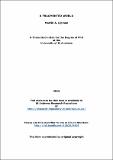Files in this item
A fragmented world
Item metadata
| dc.contributor.advisor | Hawley, Katherine (Katherine Jane) | |
| dc.contributor.author | Lipman, Martin A. | |
| dc.coverage.spatial | x, 227 p. | en_US |
| dc.date.accessioned | 2016-09-14T14:54:19Z | |
| dc.date.available | 2016-09-14T14:54:19Z | |
| dc.date.issued | 2015 | |
| dc.identifier | uk.bl.ethos.694553 | |
| dc.identifier.uri | https://hdl.handle.net/10023/9498 | |
| dc.description.abstract | Objects often manifest themselves in incompatible ways across perspectives that are on a par. Phenomena of this kind have been responsible for crucial revisions to our conception of the world, both philosophical and scientific. The standard response to them is to deny that the way things appear from different perspectives are ways things really are out there, a response that is based on an implicit metaphysical assumption that the world is a unified whole. This dissertation explores the possibility that this assumption is false, that the world is fragmented instead of unified. On the proposed understanding of such worldly fragmentation, there is a notion of co-obtainment according to which two facts may obtain without co-obtaining. Since not every fact that obtains also co-obtains with every other fact, two incompatible facts may both obtain, as long as they do not co-obtain in the introduced sense. The possibility of such fragmentation sheds new light on a range of phenomena. It allows us to explore a view of time that takes the notion of passage as its defining primitive. It bolsters a no-subject view of experience against the objection that it leads to solipsism. It allows a realist view about colours to withstand the objection from conflicting appearances. And, it makes room for a view on which things really have the properties that are attributed to objects and events across different frames of reference, such as length, mass, duration and simultaneity. Overall, fragmentalism changes the way in which the manifest image feeds into an objective conception of the world: what is manifest to us is not misleading in what sort of properties it shows the world to have, it's only misleading in making it seem more unified than it really is. | en_US |
| dc.language.iso | en | en_US |
| dc.publisher | University of St Andrews | |
| dc.subject.lcc | BD348.L5 | |
| dc.subject.lcsh | Perspective (Philosophy) | en_US |
| dc.subject.lcsh | Whole and parts (Philosophy) | en_US |
| dc.title | A fragmented world | en_US |
| dc.type | Thesis | en_US |
| dc.contributor.sponsor | St Andrews and Stirling Graduate Programme in Philosophy (SASP) | en_US |
| dc.type.qualificationlevel | Doctoral | en_US |
| dc.type.qualificationname | PhD Doctor of Philosophy | en_US |
| dc.publisher.institution | The University of St Andrews | en_US |
This item appears in the following Collection(s)
Items in the St Andrews Research Repository are protected by copyright, with all rights reserved, unless otherwise indicated.

